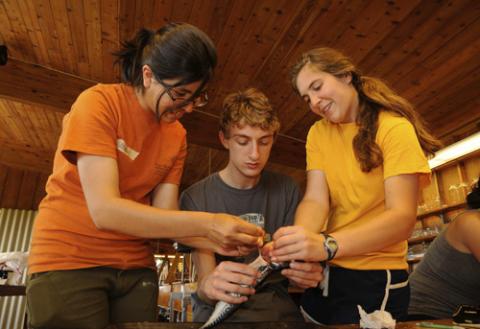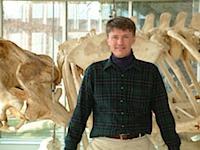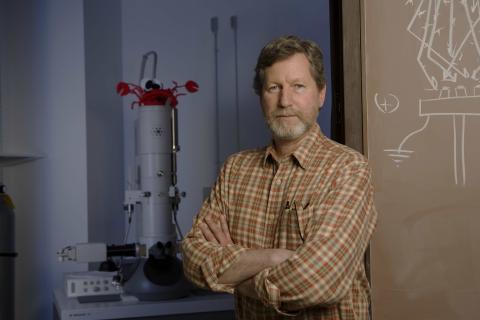Course Dates
June 30, 2025 to July 21, 2025
Prerequisites
None
Equivalent Note
Cornell students: this course is equivalent to BioEE 1780.
Cornell students, this course fulfills the following requirements (just like BioEE 1780):
- Biology Majors: Evolutionary Biology and Diversity core requirement
- Recommended biology course for the Science of Earth Systems major
- Intro Bio requirement for Biological Engineering students
- ALL STUDENTS: See the Financial Support & Scholarships page for details about a course-specific award which can be applied towards the cost of enrolling in Marine Parasitology and Disease and other select SML courses for summer 2024.
Course Description

Evolution and Marine Diversity "EMD" students learning from their TA in Palmer-Kinne Lab.
This course explores the patterns of diversity and processes of evolution. Topics include the diversity of life, the fossil record, macroevolutionary patterns, the genetics and developmental basis of evolutionary change, processes at the population level, evolution by natural selection, modes of speciation, long-term trends in evolution, and human evolution. Field exercises and laboratory work are emphasized.
During this course, students will:
- Understand the underlying causal principles of evolutionary diversification;
- Identify core taxa in the tree of life, their characteristics and understand the relationships among them;
- Become familiar with a number of experimental and synthetic approaches to analyzing and discovering evolutionary processes and patterns;
- Discuss knowledgeably the dimensions of evolutionary issues that require decisions in our society.
Internship opportunity: This course is recommended experience for SML's Parasite Ecology Internship.
"This course offers a unique blend of field/lab work, as well as other exciting opportunities, including a whale watch and intertidal projects. The heavy emphasis on hands-on learning was a great way to literally get your feet wet. You work closely with the staff, and even get a taste of the socratic method thanks to the small class size." - Anthony Teng (SML '16, Cornell '18)
Status:
Closed
Course Numbers
Cornell: BIOSM 1780 (4 Credits)
UNH: MEFB 530 (5 Credits)
Faculty
Dr. Warren Allmon

Director Paleontological Research Institution at the Museum of the Earth; Hunter R. Rawlings III Professor of Paleontology at Cornell University
Warren Allmon, Director of the Paleontological Research Institution (PRI) is a paleontologist whose research contributes to reconstruction of paleo-oceanographic and paleoclimate history, as well as examining the history of life.
Dr. Jan Factor

Professor, School of Natural and Social Science, Purchase College SUNY
Dr. Jan Robert Factor earned his Doctorate in Zoology from Cornell University in 1980, which was followed by a Smithsonian Postdoctoral Fellowship at the Smithsonian's Marine Station in Ft. Pierce, Florida (a field station of the National Museum of Natural History) and a Lectureship at Cornell. A member of the faculty of Purchase College, State University of New York, since 1982, Dr. Factor is now Professor of Biology, Chair of the Biology Program, and Director of the Microscopy Laboratory.
Dr. Factor is editor of the standard reference text on the American lobster, Biology of the Lobster Homarus americanus (Academic Press, 1995).
His long-standing relationship with the Shoals Marine Laboratory (Appledore Island, Isles of Shoals, Maine) includes being a Core Faculty member during summers since 1981. He currently teaches in the Evolution and Marine Diversity and the Ecology and the Marine Environment courses there.
